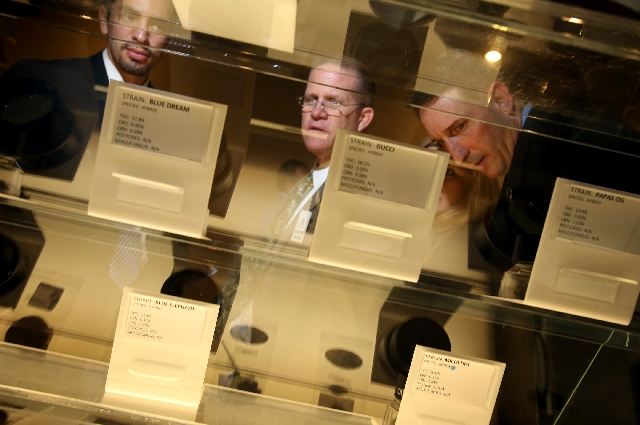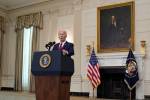Nevada legislators hook up with Arizona drug dispensary


GLENDALE, Ariz. — A contingent of Nevada lawmakers checked out a medical marijuana dispensary here Friday but they weren’t shopping. No drugs or money changed hands during their visit.
Led by Senate Judiciary Chairman Tick Segerblom, D-Las Vegas, the lawmakers took a fact-finding trip to see how the nonprofit dispensary system works and whether it can be a model for Nevada’s much older but more confusing medical marijuana program.
The lawmakers toured the nondescript Arizona Organix dispensary on West Glendale Avenue, the first to be licensed in the state in November.
About 30,000 Arizonans have medical marijuana cards. Nevada has about 3,645 medical marijuana card holders.
HOW IT WORKS IN ARIZONA
Arizona voters narrowly approved the medical marijuana program in 2010. With the establishment of the dispensaries, new patients will no longer be able to grow their own supply if they live within 25 miles of one. Existing patients will be required to stop growing when they renew their cards.
Bill Myer, one of three owners of the dispensary, said the nonprofit sees about 100 patients a day.
They pay $55 for an eighth of an ounce of “green crush,” including 10.2 percent sales tax. Other varieties are also offered for sale. The prices are not regulated by the government.
Patients arriving at the dispensary first show their medical marijuana cards at a front room waiting area. They are then escorted into a secured backroom to buy the marijuana, which Myer said is grown off site.
They are assisted in the back room, two at a time, by “bud tenders.” They also pay in the secured room before taking the product home for consumption.
The back room has several different types of marijuana on display.
Myer said the dispensary has paid in excess of $100,000 in sales taxes since opening Dec. 6.
OWNER A PATIENT, TOO
Myer is a patient himself.
“I use a medically accepted brownie every night at 9 o’clock,” he said.
“We have some very strict guidelines from the state and we’re danged happy for them,” Myer said. “Because we have some unregulated business going on in the city right now.”
“We’re the only legal dispensary in the greater Phoenix area,” he said. “Give us a chance to show you we’re good guys and it can be done right.”
Myer said the dispensary will refuse to serve someone who is inebriated. There is no loitering. The baggies are sealed and can’t be opened on the premises.
Patient Nick Zeilenga, 30, came to the dispensary the first day it opened. He takes the drug for pain and to increase his appetite after a severe motorcycle accident that caused spinal injuries.
He comes in for a new supply about every two weeks.
“This has replaced 10 milligrams of Percocet six times a day,” he said. “It’s for pain, muscle inflammation and muscle cramps.”
Well-regulated dispensaries are the way to go, but they need a proper amount of regulation, he said.
“I think people want to be legitimate about this now, because people actually have medical issues that need addressing,” he said. “I almost wish there were more dispensaries because then they wouldn’t get swamped so bad,” Zeilenga said.
NEVADANS ON THE TRIP
The Nevada lawmakers, including Judiciary Committee members Mark Hutchison, Scott Hammond and Ruben Kihuen, nonmember David Parks and Assemblywoman Michele Fiore, R-Las Vegas, were accompanied by staff and Nevada media.
Also on the trip were Steve Yeager of the Clark County public defender’s office, and Las Vegan Jay Matos, who is looking at forming a group to help the push to reform Nevada’s medical marijuana program.
“It’s broken,” he said of Nevada’s law.
Segerblom said he was impressed by the operation.
“It’s incredibly clean, it seems very efficient, it seems, at least from here, to be very tight as far as the control over it,” he said. “If we could duplicate this in Nevada I don’t see how anyone could object.”
After the dispensary visit, the group toured a growing facility now under construction to provide marijuana to the Organix dispensary. Myer said the business still runs the risk of federal prosecution.
NEVADA’S PROGRAM
Nevada has had a medical marijuana program since 2001, after 65 percent of voters approved it in the 2000 general election. But there is no way for patients to legally obtain the drug unless they grow it themselves or get it free from caregivers who will grow it on their behalf.
There is no direction from the state Health Division, which manages the program, on how patients can acquire seeds for growing either.
Segerblom said it is time to clean up the ambiguity by authorizing the creation of marijuana dispensaries as Arizona and other states have done.
“In Las Vegas there are people being arrested all the time,” he said in an interview before the trip. “No. 1, if you have a card, there’s no way to get it (the drug) legally. No. 2 there are people who are theoretically trying to provide it to people with cards and they are being arrested.
“And judges are throwing out the prosecutions because the law is so screwed up,” Segerblom said. “They are saying if you have a right to purchase it then someone has to be able to produce it.”
Medical marijuana cards from other states are not recognized in Nevada. So patients that visit Las Vegas as tourists can be arrested, he said.
THE FIX: SENATE BILL 374
On Monday Segerblom introduced Senate Bill 374, which would allow the creation of nonprofit medical marijuana dispensaries in Nevada.
It would also create reciprocity with other states that have medical marijuana programs.
After the Arizona tour, Segerblom said he will likely change his bill to establish for-profit dispensaries instead.
“My expectation is that a year from now, we would have some dispensaries up and running,” Segerblom said. “But a lot depends on what the governor supports or doesn’t support.”
Contact Capital Bureau reporter Sean Whaley at swhaley@reviewjournal.com or 775-687-3900.


















